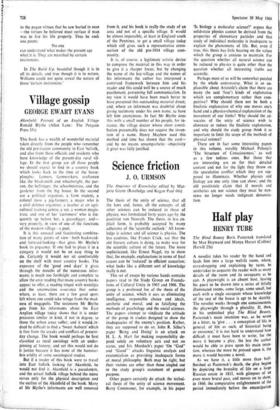Village gossip
GEORGE EWART EVANS
Akenfield: Portrait of an English Village Ronald Blythe (Allen Lane: The Penguin Press 35s)
This book has a wealth of wonderful material taken directly from the people who remember the old pre-tractor community in East Suffolk, and also from those officials and residents who have knowledge of the present-day rural., vil- lage. In the first group are all those people we should expect to find in a country book which looks back to the time of the horse- ploughs : farmers, farmworkers, craftsmen like the blacksmith and wheelwright, the par- son, the bellringer, the schoolmistress, and the gardener from the big house. In the second are a political organiser, a farm student, a colonel (now a pig-farmer), a major who is a civil defence organiser, a teacher at an agri- cultural training centre, a vet, a woman magis- trate, and one of her 'customers' who is fre- quently up before her, a gravedigger, and— very properly, in view of one of the functions of the modern village—a poet.
It is this unusual and fascinating combina- tion of many points of view—both backward- and forward-looking—that gives Me Blythe's book its piquancy. If one had to place it in a category it would not be an easy thing to do. Certainly it would not sit comfortably on the shelf with most country books. The exposure of the 'good owd days' it gives through the mouths of the numerous infor- mants is much too forthright and complete to allow the cosy reading that many country books appear to offer, a reading tinged with nostalgia and the unconscious assurance that some- where, at least, there are a few good spots left where one could take refuge from the mad- ness of megapolis. The testimony Mr Blythe gets from his informants about the East Anglian village today shows that it is under pressures similar in kind, if not in degree, to those the urban areas suffer; and it woult‘ in- deed be difficult to find a 'Sweet Auburn' which is free from the creaks and conflicts of present- day change. The book would perhaps be best classified as rural sociology with an under- pinning of history; and yet this would not-do it justice because it has none of the humour- less aridity of some sociological studies.
But if a reader of this book were to travel into East Suffolk looking for Akanfield,r, he would not find it. Akenfield is a pseudonym, and the actual Suffolk village behind the name serves only for the physical description and the outline of the Akenfield of the book. Many of Mr Blythe's informants are well, removed from it, and his book is really-the study of an area and not of a specific village. It would be almost impossible, at least in England south of the Pennines, to get a small village today which still gives such a representative cross- section of the old pre-1914 village com- munity.
It is, of course, a legitimate artistic device to compress the material in this way in order to give it a sharper focus; but by changing the name of the key-village and the names of his informants the author has interposed a contrived framework between him and his reader and this could well be a source of much puzzlement, preventing full communication. In my view it would have been much better to have presented this outstanding material direct; and, where an informant was doubtful about giving testimony under his own name, to have left him anonymous. In fact Mr Blythe does this with a small number of his people, for in- stance, the village doctor whose short contri- bution presumably does not require the inven- tion of a name. Henry Mayhew used this method and time has shown that the cool— and by no means unsympathetic—objectivity it gives was fully justified.


































 Previous page
Previous page